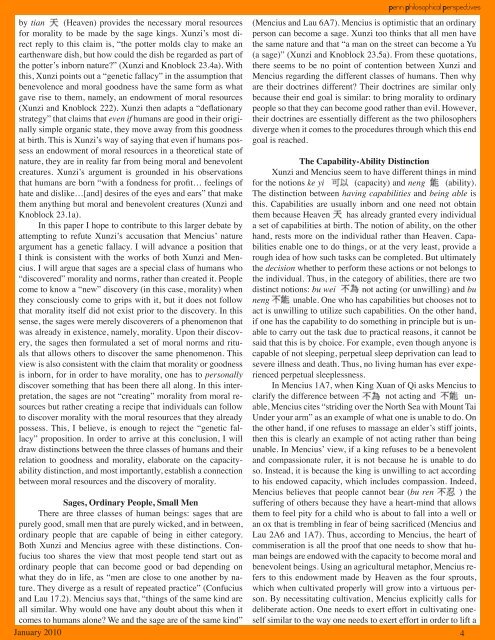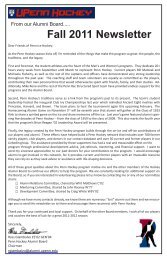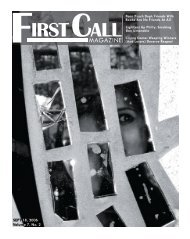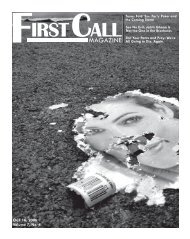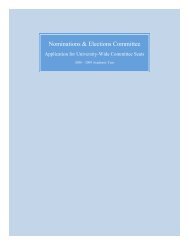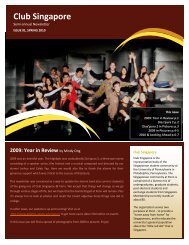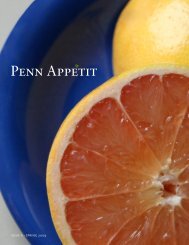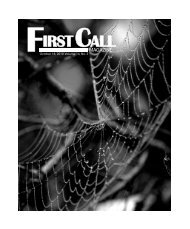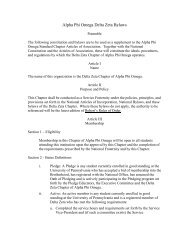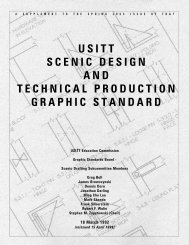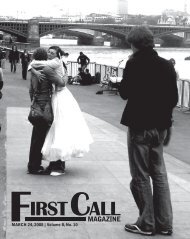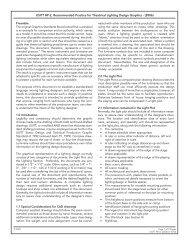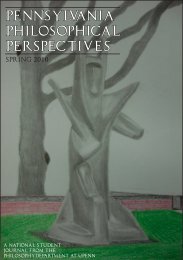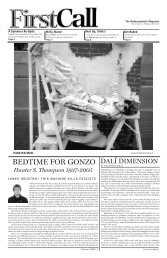Penn Philosophical Perspectives - University of Pennsylvania
Penn Philosophical Perspectives - University of Pennsylvania
Penn Philosophical Perspectives - University of Pennsylvania
- No tags were found...
You also want an ePaper? Increase the reach of your titles
YUMPU automatically turns print PDFs into web optimized ePapers that Google loves.
y tian (Heaven) provides the necessary moral resources rectreply to this claim is, “the potter molds clay to make anearthenware dish, but how could the dish be regarded as part <strong>of</strong>benevolence and moral goodness have the same form as whatgave rise to them, namely, an endowment <strong>of</strong> moral resourcesstrategy” that claims that even if humans are good in their originallysimple organic state, they move away from this goodnesssessan endowment <strong>of</strong> moral resources in a theoretical state <strong>of</strong>nature, they are in reality far from being moral and benevolent In this paper I hope to contribute to this larger debate by argument has a genetic fallacy. I will advance a position thatcius.I will argue that sages are a special class <strong>of</strong> humans who“discovered” morality and norms, rather than created it. Peoplecome to know a “new” discovery (in this case, morality) whenthey consciously come to grips with it, but it does not followthat morality itself did not exist prior to the discovery. In thissense, the sages were merely discoverers <strong>of</strong> a phenomenon thatwas already in existence, namely, morality. Upon their discovery,the sages then formulated a set <strong>of</strong> moral norms and ritualsthat allows others to discover the same phenomenon. Thisview is also consistent with the claim that morality or goodnessis inborn, for in order to have morality, one has to personallydiscover something that has been there all along. In this interpretation,the sages are not “creating” morality from moral resourcesbut rather creating a recipe that individuals can followto discover morality with the moral resources that they alreadypossess. This, I believe, is enough to reject the “genetic fallacy”proposition. In order to arrive at this conclusion, I willdraw distinctions between the three classes <strong>of</strong> humans and theirrelation to goodness and morality, elaborate on the capacityabilitydistinction, and most importantly, establish a connectionbetween moral resources and the discovery <strong>of</strong> morality.Sages, Ordinary People, Small MenThere are three classes <strong>of</strong> human beings: sages that arepurely good, small men that are purely wicked, and in between,ordinary people that are capable <strong>of</strong> being in either category. fuciustoo shares the view that most people tend start out asordinary people that can become good or bad depending onwhat they do in life, as “men are close to one another by nature.They diverge as a result <strong>of</strong> repeated practice” (ConfuciusJanuary 2010<strong>Penn</strong> <strong>Philosophical</strong> <strong>Perspectives</strong>the same nature and that “a man on the street can become a Yuare their doctrines different? Their doctrines are similar onlybecause their end goal is similar: to bring morality to ordinarypeople so that they can become good rather than evil. However,their doctrines are essentially different as the two philosophersdiverge when it comes to the procedures through which this endgoal is reached.The Capability-Ability Distinction for the notions ke yi (capacity) and neng (ability).The distinction between having capabilities and being able isthis. Capabilities are usually inborn and one need not obtainthem because Heaven has already granted every individuala set <strong>of</strong> capabilities at birth. The notion <strong>of</strong> ability, on the otherhand, rests more on the individual rather than Heaven. Capabilitiesenable one to do things, or at the very least, provide athe decision whether to perform these actions or not belongs tothe individual. Thus, in the category <strong>of</strong> abilities, there are twodistinct notions: bu wei not acting (or unwilling) and bunengif one has the capability to do something in principle but is unableto carry out the task due to practical reasons, it cannot besaid that this is by choice. For example, even though anyone iscapable <strong>of</strong> not sleeping, perpetual sleep deprivation can lead tosevere illness and death. Thus, no living human has ever experiencedperpetual sleeplessness. clarify the difference between not acting and un-the other hand, if one refuses to massage an elder’s stiff joints,then this is clearly an example <strong>of</strong> not acting rather than beingand compassionate ruler, it is not because he is unable to doso. Instead, it is because the king is unwilling to act accordingto his endowed capacity, which includes compassion. Indeed,bu ren ) thesuffering <strong>of</strong> others because they have a heart-mind that allowsthem to feel pity for a child who is about to fall into a well orcommiseration is all the pro<strong>of</strong> that one needs to show that humanbeings are endowed with the capacity to become moral andfersto this endowment made by Heaven as the four sprouts,which when cultivated properly will grow into a virtuous per-selfsimilar to the way one needs to exert effort in order to lift a4


